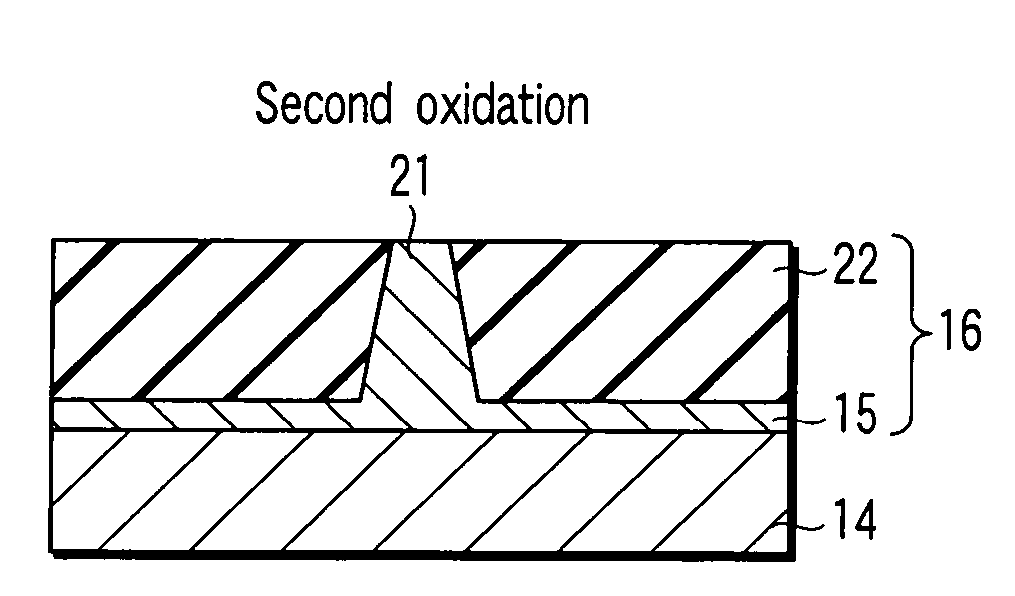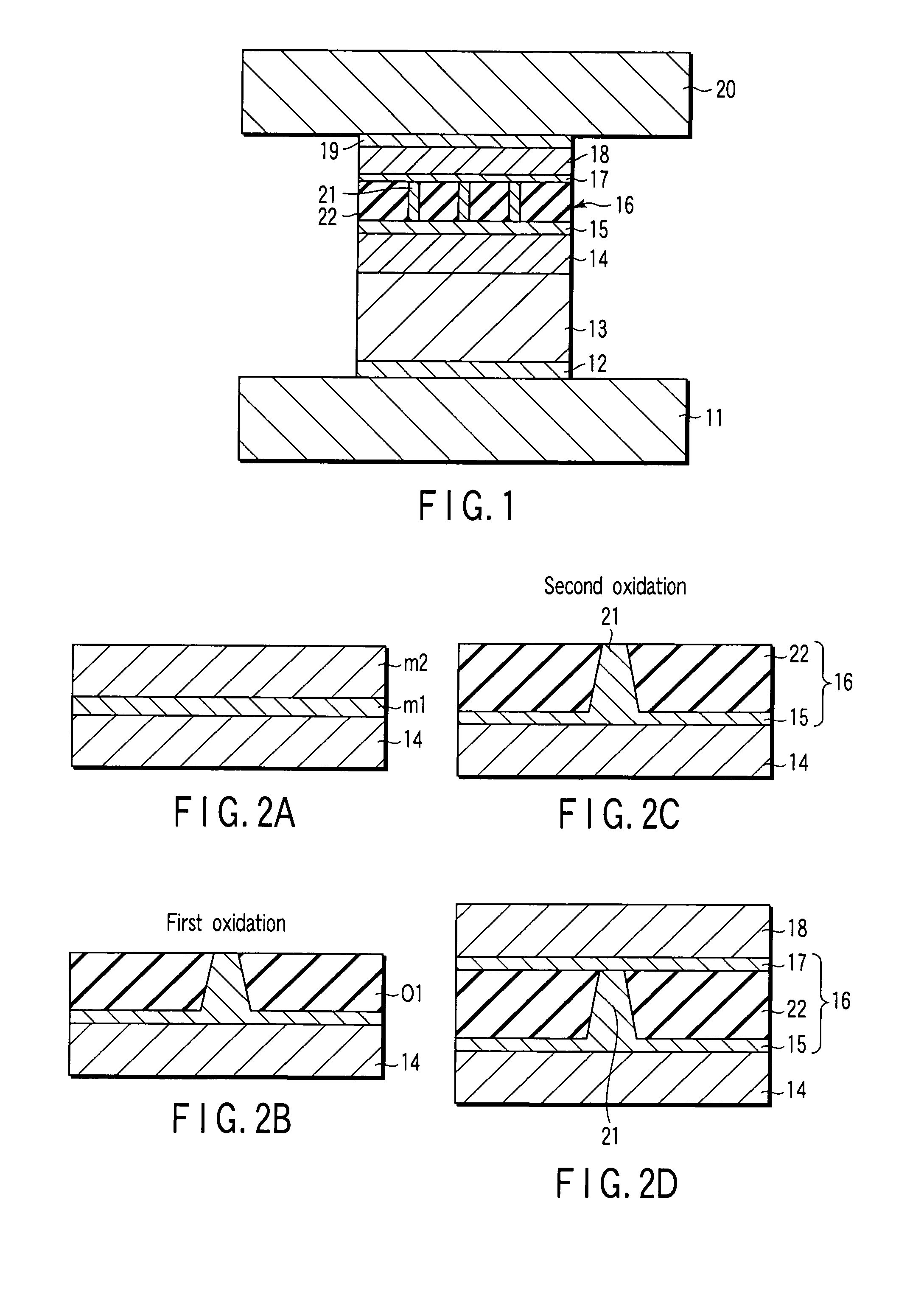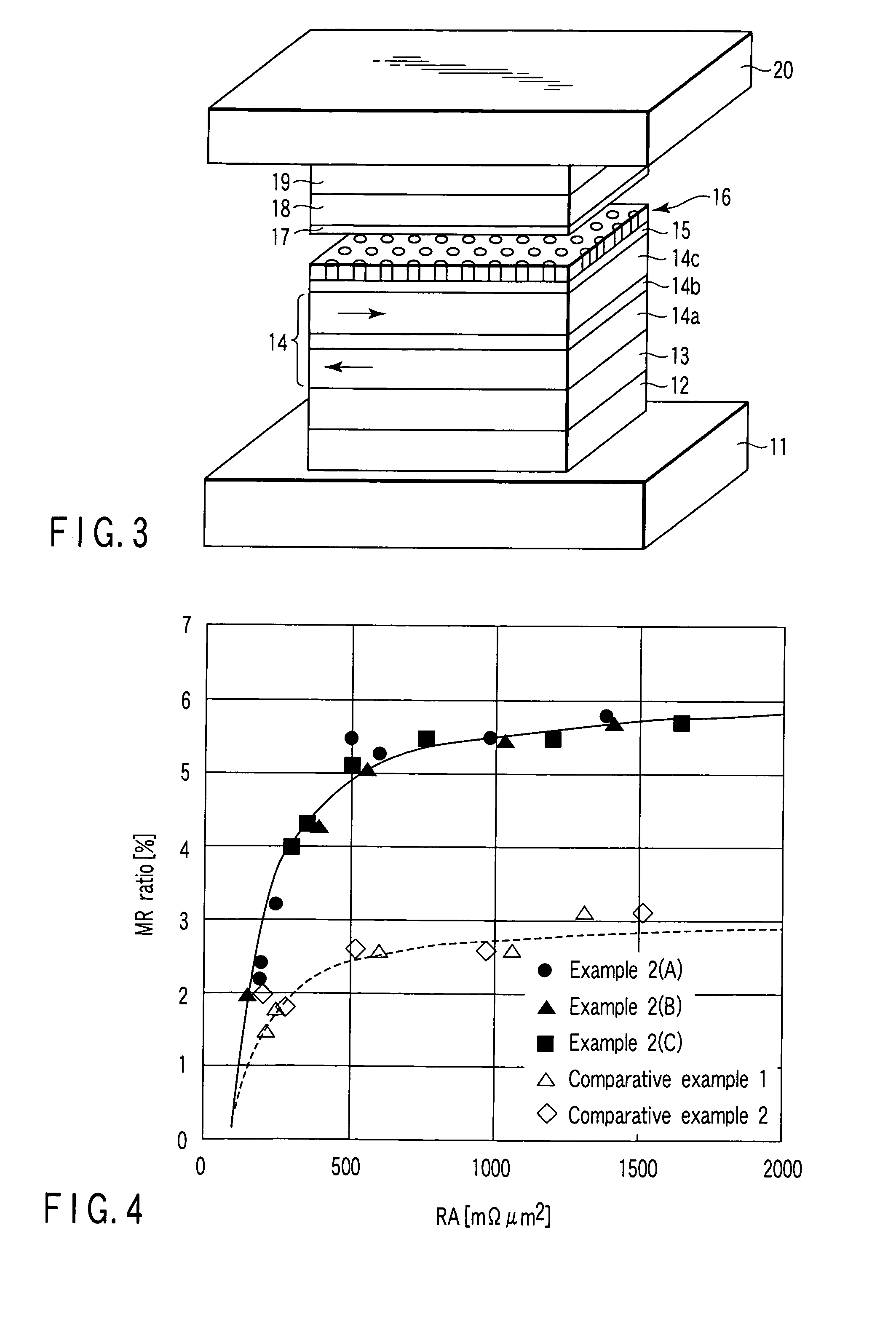Method for manufacturing magnetoresistive element
a technology of magnetoresistive elements and manufacturing methods, which is applied in the field of manufacturing methods of magnetoresistive elements, can solve the problems of insufficient element characteristics, low purity, and difficulty in satisfying both the areal resistance ra and the mr ratio of ccp-cpp elements fabricated by using the above method
- Summary
- Abstract
- Description
- Claims
- Application Information
AI Technical Summary
Benefits of technology
Problems solved by technology
Method used
Image
Examples
example 1
[0050]In this Example, a magnetoresistive element having a stacked structure shown in FIG. 3 is fabricated in the following stacked structure:
[0051]lower electrode 11,
[0052]underlayer 12: Ta [5 nm] / Ru [2 nm],
[0053]pinning layer 13: Pt50Mn50 [15 nm],
[0054]pinned layer 14: Co90Fe10 [3.6 nm] / Ru [0.9 nm] / {(Fe50Co50 [1 nm] / Cu [0.25 nm])×2 / Fe50Co50 [1 nm]},
[0055]metal layer 15: Cu [0.5 nm],
[0056]spacer layer 16: Al2O3 insulating layer 22 and Cu current paths 21 (produced by depositing Al90Cu10 [1 nm] and then performing first and second oxidation treatments),
[0057]metal layer 17: Cu [0.25 nm],
[0058]free layer 18: Co90Fe10 [1 nm] / Ni83Fe17 [3.5 nm],
[0059]cap layer 19: Cu [1 nm] / Ta [5 nm],
[0060]upper electrode 20.
[0061]The lower electrode 11 for supplying a sense current in the direction perpendicular to the spin valve film is formed on the substrate. Ta [5 nm] and Ru [2 nm] are deposited on the lower electrode 11 as the underlayer 12. The Ta layer is a buffer layer that suppresses roughness...
example 2
[0082]In this Example, CCP-CPP elements are manufactured with various methods and characteristics of these CCP-CPP elements are compared. These results will be described below. The magnetoresistive elements prepared have the following stacked structure:
[0083]lower electrode 11,
[0084]underlayer 12: Ta [5 nm] / Ru [2 nm],
[0085]pinning layer 13: Pt50Mn50 [15 nm],
[0086]pinned layer 14: Co90Fe10 [4 nm] / Ru [0.9 nm] / Co90Fe10 [4 nm],
[0087]metal layer 15: Cu [0.5 nm],
[0088]spacer layer 16: Al2O3 insulating layer 22 and Cu current paths 21 (produced by depositing Al90Cu10 [0.5 to 1 nm] and then performing first and second oxidation treatments),
[0089]metal layer 17: Cu [0.25 nm],
[0090]free layer 18: Co90Fe10 [1 nm] / Ni83Fe17 [3.5 nm],
[0091]cap layer 19: Cu [1 nm] / Ta [5 nm].
[0092]In this Example, each CCP-CPP element is prepared by changing the thickness of the AlCu layer used as the second metal layer in a range of 0.5 to 1 nm. Since change in the AlCu thickness brings about change in the area ra...
PUM
| Property | Measurement | Unit |
|---|---|---|
| accelerating voltage | aaaaa | aaaaa |
| accelerating voltage | aaaaa | aaaaa |
| accelerating voltage | aaaaa | aaaaa |
Abstract
Description
Claims
Application Information
 Login to View More
Login to View More - R&D
- Intellectual Property
- Life Sciences
- Materials
- Tech Scout
- Unparalleled Data Quality
- Higher Quality Content
- 60% Fewer Hallucinations
Browse by: Latest US Patents, China's latest patents, Technical Efficacy Thesaurus, Application Domain, Technology Topic, Popular Technical Reports.
© 2025 PatSnap. All rights reserved.Legal|Privacy policy|Modern Slavery Act Transparency Statement|Sitemap|About US| Contact US: help@patsnap.com



